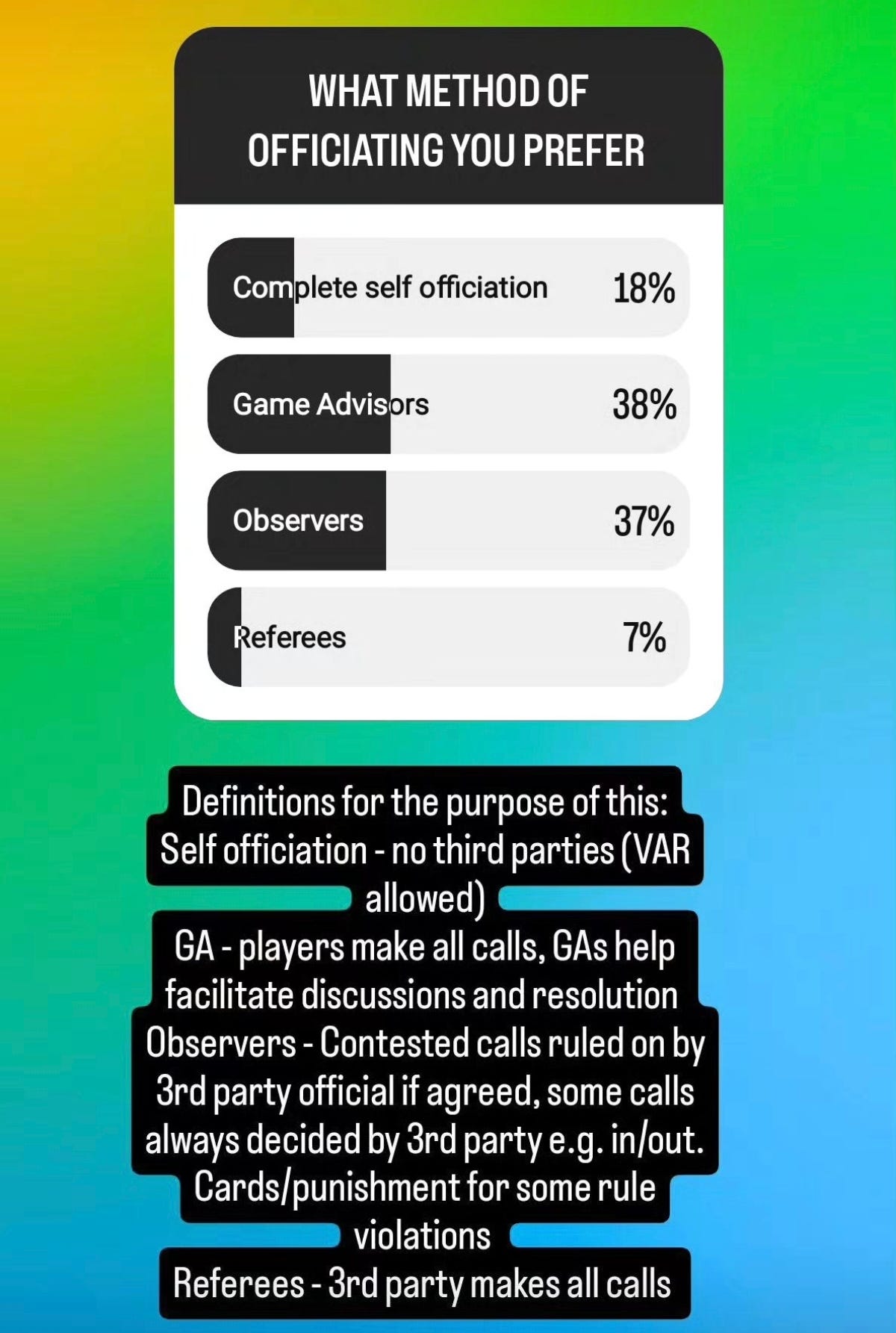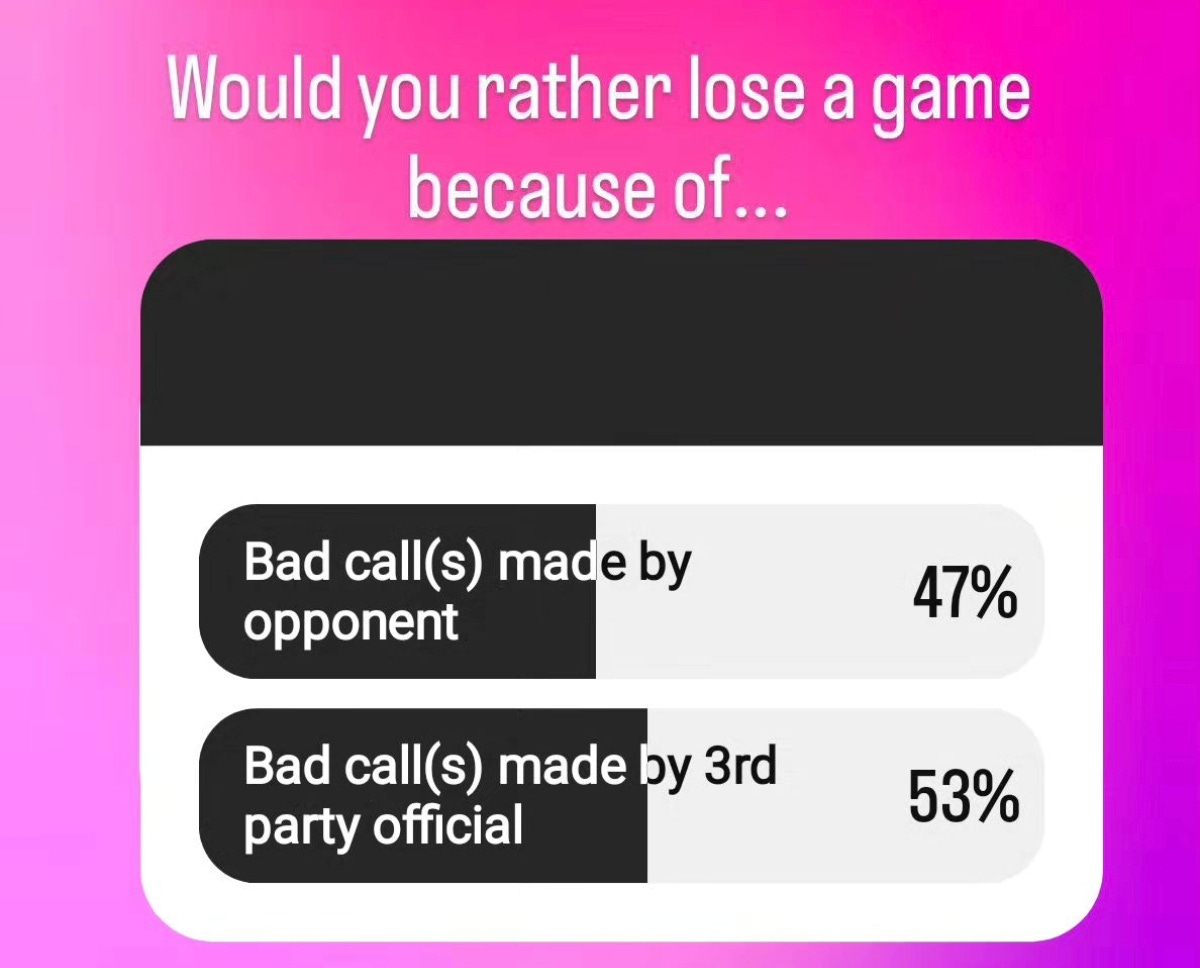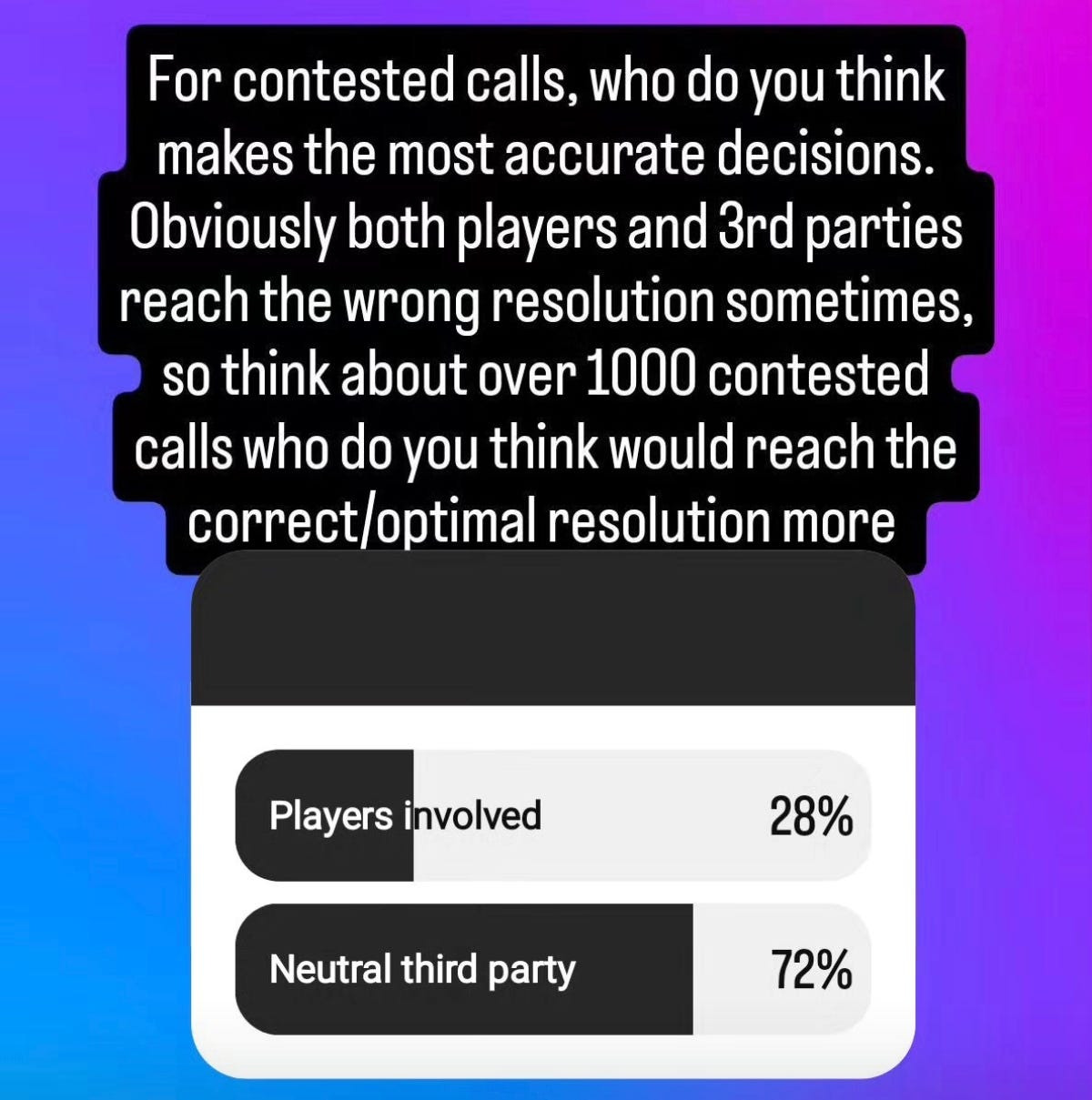I don’t tend to mention calls when I’m writing or talking about games or tournaments. But that doesn’t mean I don’t have opinions, so here’s the one time I’m going to write about them.
I think Ultimate is generally pretty good for officiating. Every time I go back and play another sport it’s always a culture shock how much aggression there is towards referees. I still vividly remember playing my first tag rugby game which was a super low level of what is a very social sport and being taken aback that both teams spent a huge part of their time shouting at the 18 year old ref.
Watching any professional sport on TV is also illuminating to see how much focus there is on refereeing decisions, and how little there is sometimes no discussion on any substantive on how the game is played amidst all the furore about refereeing decisions. Ultimate very rarely has games like that. I’d hate to see Ultimate go down that path.
I asked a few questions on instagram last week to get a sense of where people (that follow me on instagram and vote in polls) lands on a few of the areas I think are important to consider.
1. What type of officiating do you prefer
For the first question I just wanted to get a sense of where people initially landed on the type of officiating.
I was slightly surprised that Game Advisors were so popular after some of the criticisms of that system after WUC this year. I certainly wasn’t surprised to see that the majority of people preferred some type of 3rd party to be involved. I think this is where I land as well but with a big caveat: where are these officials going to come from?
There was a lot of debate after WFDF events this year about what exactly Game Advisors should be able to do in a game. I don’t think any of those things matter until the recruitment, training and experience for GAs is figured out because I’m not convinced about those aspects of the programme. Those issues all come back to the same central point: GAs are only used by WFDF at international events. The European Federations doesn’t use them. The Irish Federation doesn’t use them. This is so backwards it’s actually a bit crazy. If I want to ref any other sport I’m not starting out reffing world championships. I’m reffing local youth games and I’m probably going to be bad at it for a while. Having GAs be a Worlds only role means no local recruitment, no local training, no opportunity to practice regularly at the role. A lot of people I speak to want GAs over other officiation methods, but want better GAs who are a little more active. But you can’t just wish that into existence or write a better procedure and expect it’ll somehow manifest.
The Observer programme avoids a lot of the GA issues. The US is centrally run and well funded so it has a much better setup for recruiting, training and gaining experience for it’s observer pool. Is that replicable anywhere else? I don’t think anyone else can pay for that, or has the population to draw enough observers from.
2. How do you want to lose
This was fascinating to watch throughout the day the poll was going, because the gap was never bigger than 53-47 either way every time I checked in. I think it’s an interesting philosophical point to think about. Whatever form of officiating you play under you will suffer from bad calls. That’s really the point I wanted to get across by asking this.
There is no system that will result in perfect calls. ‘Bad call happened therefore system bad’ is bad analysis. It’s easy to get caught up in the aftermath of a bad call or a bad game and think a different system than used right there would lead to a better outcome and you’d be right in that single instance but maybe not across all games.
3. Who makes more accurate calls?
I’m not a professional question-asker and I don’t think I did a particularly good job of framing this one. It’s also quite nuanced and I agree with some of the messages I got that said essentially third parties are much better at some calls but probably worse at others.
Yeah and saying ‘neutral’ third party is both (a) leading the answer but also (b) untrue at least some of the time. Still, even if I’d asked this better I’d expect to see a strong majority agreeing that third parties not involved make more accurate decisions in most cases.
4. What rewards better behaviour
This result I found interesting. I really wasn’t sure it would go this heavily towards self-officiation because when self-officiation goes wrong it can go really badly wrong and I thought more people would swing that way.
I received a number of messages from players that have played under third party officiation, all saying that playing under that culture shifts energy more towards pushing the rules and playing the refs/observers. Which is hardly surprising (it’s my experience of every reffed sport), butI should be clear that not all those messages were actually critical of that. We all like different things!
5. What is more important in an officiating system?
I had a strong feeling the way the previous two polls would shake out so I asked this last question.
It’s been interesting watching the introduction of video systems into football over the last few years and the reaction to them. The video systems very obviously make decisions more accurate. But that hasn’t necessarily made them popular, and you don’t need to look very hard to find fans and players that preferred the game before video systems even though they agree they are more accurate. I’ve always been in the camp of I prefer the right decision to be arrived at and don’t really care about how so the results of this was a little surprising to me.
With all these questions I was trying to make the larger point that when we’re thinking about officiating systems there’s more on the line than trying to solve for the last terrible call we saw. Officiating systems become part of what creates the culture on the pitch, and that can be in a positive way or a negative way.
I do think the less responsibility players have to uphold the rules themselves the less likely they are to do it. At the same time there definitely comes (or will come) a tipping point where mutual trust between players erodes to the point where you just need third parties. I might be a pessimist but I think that’s inevitable. The only way I could see it not happening is if the sport grows extremely slowly so a really tight grip could be maintained on the culture.
I said at the start I avoid talking about calls as much as possible but believe me, I’m very often tempted to! I don’t think it’s fair to publicly put players, GAs or observers on blast for mistakes. I also do think from my experience that Ultimate is pretty good as far as sports go. The amount of games where the result is impacted by cheating or bad officiating decisions seems pretty small. Which isn’t to minimise the pain when it does go wrong, and I’m fully on board to see the sport try to eliminate those scenarios while not losing the responsibility of teams to uphold the game. That’s a pretty fine line to to try and walk. The big issue for me really is the resources to build good officiating programmes and getting buy in for those from everyone. Without solving that I don’t see how things get much better.









Would be fascinated to see a broader survey on this, even one sponsored by the national/international organizations. I think this was well-designed but might render some more conclusive results with a larger sample size.
Hi Ian, thanks for doing that research, interesting to read.
I'm one of a few people who train Game Advisors around the world, so have access to a bit of info I thought might add some colour (and also I've spent a little time reflecting on how to deliver better GA performances).
I 100% agree that the hardest part of the job is being sharp after long period without practice. It is tough to deliver the level of performance I expect of myself f I haven't done it for say 4 months, and I'm one of the fortunate ones that gets to GA multiple times a year.
That's a feeling most GAs will be familiar with, but things are changing, so I thought I'd share some news from further afield... Australia and Colombia have large pools, having used GAs for over a decade. Over the past couple of years China, Japan, Malaysia, Thailand, & Mexico have all added GAs to their Nationals. India & Philippines are figuring out how they want to use them (they're at the Indian College series, and at Manila Spirits). In Europe, GAs have been at French Nationals for the past few years, and in the UK GAs will be coming to College Nationals from 2025.
For the local federation adding GAs helps to deliver player education as well as often being reported by players as giving an event a more professional feel. From my PoV as a Trainer, I'm looking forward to seeing those extra reps between events translate to more consistency in our GAs at Worlds events.
Hope that helps add some colour.
If you (Ian) or readers have got Q's about the GA program, feel free to ask them here and I'll try to respond.
If you (reader) don't like the core concept of GAs as a self-officiating method, that's okay, I'm not here to get into protracted discussions about that; I'm fine with us having different perspectives.
If you (reader) want to know how to have GAs trained in your local community, feel free to DM me.